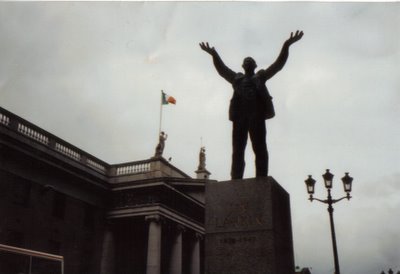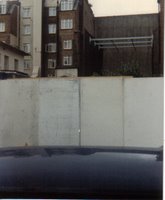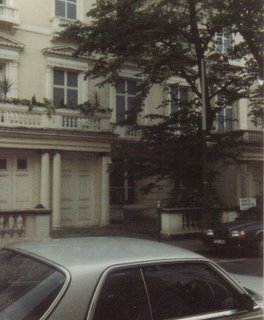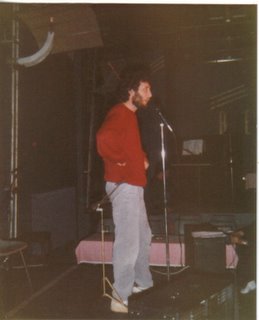Back in 1974 I was interviewed for a history teaching job at a school in Essex. It seemed a pleasant place. They showed me around, treated me to a pint and pie up the pub, then took me back for the interview. It seemed to be going OK, till one of the three men interviewing me asked:
"Supposing a pupil came to you and said What's the point of all this history, Sir? It's all in the past;and we want to learn about the future, and new things...' How would you answer that?"
I answered that I would say, if you wanted to know about the future, and how things could change, it helped to look at how things had changed in the past, to learn how things change.
The immediate follow-up question came from another staff member: "Do you have any particular political convictions?"
I thought that was an impressive leap. "Yes," I acknowledged, then paused. I'd recently heard a fellow I knew at Lancaster saying how impressed an interview panel had been by his articulate opinions. But he was younger than me, and maybe his interviewers had felt safer indulging him, or maybe (besides having attained a better degree) he'd just been lucky. I did not know the politics of my interviewers, why should they hear mine?
I smiled at them, raising my eyebrows slightly as though expecting a further question. There was a silence. Then the head cleared his throat. "I think what Mr.Higginbotham was concerned about was whether your political convictions would influence the way you taught history."
"Oh no," I assured them, earnestly, "It is my job to teach the students to think, not to tell them what to think"..
They did not seem convinced, still less reassured. Somehow I didn't feel they were worried lest I be a member of the Conservative Club. Still, I might have made a good impression as a reasonably intelligent and conscientious person.
That evening I told a couple of friends, Alan Clinton and Geoff Pilling, about the perspicacious interviewer who had recognised in my view of history a political outlook. They appeared concerned only at my naievety. "You've been fingered", said Geoff simply.
Whatever the explanation, I didn't get the job and I didn't go into teaching.
Perhaps I could have answered that question about why bother learning history just as honestly and without inviting questions about my world outlook by saying "because it's fun".
Not always, it depends on the teacher, but it can be.
In my first year at Salford Grammar School, in a class which like me had come via Secondary Moderns first, we had a history teacher called Mr.Morgan, who somehow managed to infect us all with his enthusiasm for Roman Britain. This wasn't Bath or St.Albans but Salford with its dark satanic mills and grimy soot-engrained Victorian public buildings. The Heritage Industry had yet to replace our industrial heritage. So it was without helpful signs that myself and a mate, following up a remark from Mr.Morgan, walked up and down the road at Knott Mill one Saturday morning till we found the right builders yard, and asked the man on the gate to allow us through to look under a railway arch at a heap of stones and clay - remains of the wall that once guarded Roman Manchester.
It wasn't much. Not like the historic buildings or ruins one saw in books or on holiday. But it was ours. A gateway from our immediate surroundings to another dimension. I reckon Mr.Morgan deserves some credit for opening our minds to such possibilities. It used to be said that the pub doors offered "the quickest way out of Salford", though nowadays alcohol is only one "mind altering" way of escape. But history not only offers an alternative cure for big city claustrophobia without needing government health warnings; it raises one's sights, to see that the "real world" in which our opportunist politicians say we have got to live is not fixed. It has not always been like this and there is no reason to suppose it must always be so. Great powers and empires can pass away just like the Romans.
So maybe the teaching of history as "fun" can also be subversive. It might not commend itself to those who relegate the subject to "an increasingly marginal role" in both primary and secondary schools, because of "a perception that it has only limited relevance to many pupils' future working lives". (a report from the British government's Qualifications and Curriculum Authority).
I've had experience of this business of "education" to fit the supposed requirements of our "future working lives". ( Notice, little importance is attached to our time outside work -which for many of us is the nearest we get to any kind of human life). In my case, I blame the Russians. The moment they sent up that sputnik someone decided (as someone did when the Prussians showed what their artillerymen could do in 1870 -hence our Education Act) that Britain needed to catch up on science and technology. So Class 3T at Salford got a new timetable - no art, no music, no English Lit, not even Biology or Woodwork (which I didn't miss), but lots of Metalwork, Maths and Physics. Of course Salford, and Britain, still had a big engineering industry back then. Before Thatcherism, and globalization.
So hard fitting students for "future working lives", or the needs of industry, when the industrialists have no idea what the future will bring, or whether they'll be in business next year, maybe next week.
But even before the 1870 Education Act, there came the 1867 Reform Act, enfranchising working men as citizens, and in 1868 the Trades Union Congress met for the first time. Those who taught and produced text books of History for schools were aware that, like the teachers of Religious Studies, they had a part to play in turning out not just factory hands and fitters, but loyal, patriotic, law-abiding citizens. (see
History for Their Masters, by Valerie E.Chanceller, and
The Use and Abuse of History, by Marc Ferro, for a comparative wider view). But like trying to turn us all out as industrial cogs, it has not always worked.
Max Hastings, author of half a dozen books on subjects like the SS Reich Division, is concerned that history teachers and syllabuses pay more attention to British, more particularly English history. "This is the country of Drake and Pepys, not Shaka Zulu", he writes. (Guardian, Tuesday December 27). Not the country of Hume or Livingstone. Of course we invaded the country of Shaka Zulu, though the blighter put up a resistance. Hastings concedes that "the Muslim peoples of the Middle East sustained higher cultural values than the crusaders" (though in my experience they're more likely to get a mention when the Maths teacher is introducing algebra than in history lessons); "But the world's development in the past 500 years has been dominated, for good or ill, by what westerners have thought and done". Indeed, like Hitler, for example.
Taking up the white man's burden, Hastings sees the proper task of history teaching as "developing a sense of British cultural identity". Referring to the need to install this in schoolchildren of West Indian and Muslim origin (as though their families were not often better educated about Britain than their white neigbours), he complains that "The British educational establishment is today defeatist about reconciling new Britons to our sense of cultural identity".
Oddly enough, as an example of what ought to be, Hastings says "a Washington historian told me recently that he often sees tears in the eyes of young Korean and Mexican Americans when he reads Lincoln's Gettysburg address to them". Perhaps they were in tears at the thought of how far America is from equality or eradicating racism. But at least it can acknowledge it is largely an immigrant country.
As a grandson of immigrants I can relate to those Korean and Mexican kids. As a child, having thought of Richard the Lionheart as a hero, I was troubled to learn in cheder (Jewish religious class) that he was a villain who slaughtered defenceless Jews. Could history have more than one interpretation? Heavy stuff for a nine year old. My Irish pals had a similar problem with Cromwell.
But having heard about the pogroms my grandparents escaped, I was also told by my parents when we went "to town", the centre of Manchester, about the Peterloo massacre in 1819. Those weavers and their families standing up for their rights became also part of my history. And I found it easy to make a connection between that and Sharpeville in 1960.
Talking of Gettysburg, I was proud to learn of the Lancashire workers who despite their privation while cotton was blocked, stood by the North against slavery, when their rulers inclined to back the plantation owners. I wonder how divisions like that fit Mr.Hasting's "cultural identity"? It was a Conservative prime minister, Benjamin Disraeli, who coined the phrase "Two Nations", to describe British society.
I was inspired to learn that the Chartists held rallies on Kersal moor where we played as kids, and that my city was birthplace of Robert Owen's Grand National Consolidated Trade Union. From the local to the global. On the same day that the Guardian published Max Hastings' views on history in education, it carried an article by George Monbiot,
"The Turks haven't learned the British way of denying past atrocities". Looking at the trial of Turkish wroter Orhan Pamiuk, charged with "denigrating Turkishness" by writing about the massacres of Armenians and Kurds,Monbiot moves on to consider recent books dealing with British atrocities in Kenya.
The soldiers were told they could shoot anyone they liked "provided they were black". Elkins's evidence suggests that more than 100,000 Kikuyu were either killed or died of disease and starvation in the camps. David Anderson documents the hanging of 1,090 suspected rebels: far more than the French executed in Algeria.I remember hearing about Hola camp, but not much. I don't remember any demonstrations about that or about Aden. I wonder if our free press will ever feel free to report such things happening, and when they will be taught about in schools.
As Monbiot asks: "It is not illegal to discuss the millions who were killed under empire. So why do so few people know about them?"
Now there's a question to ask. Perhaps those in charge of the history syllabi (?) and recruitment of history teachers might comment, if not editors like Mr.Max Hastings. But "Have you any political convictions, Mr.Pottins?" What a silly question!"
for Max Hastings article:
http://education.guardian.co.uk/schools/comment/story/0,,1674044,00.html
For letters about it:
http://education.guardian.co.uk/schools/story/0,,1674217,00.html
For George Monbiot article:
http://books.guardian.co.uk/comment/story/0,,1674478,00.html
Labels: History







